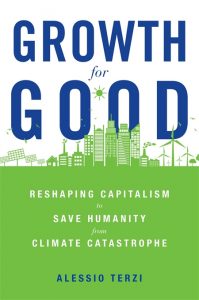In Growth for Good, Alessio Terzi makes the case that economic growth can be harnessed in the fight against climate change. Showing what is at stake in the debates surrounding the relationship between capitalism and the environment, this book will be particularly useful for policymakers and those working in environmental sociology and economics, writes Yusuf Murteza.
If you are interested in Growth for Good, you can watch a video and listen to a podcast of Alessio Terzi discussing the book for an LSE public event, recorded on 17 January 2023.
Growth for Good: Reshaping Capitalism to Save Humanity from Climate Catastrophe. Alessio Terzi. Harvard University Press. 2022.
 Find this book (affiliate link):
Find this book (affiliate link):![]()
Social thinkers from various disciplines have long discussed the future of the dominant economic system, namely capitalism, and its dynamic relationship with nature. Concepts of the Anthropocene, the Capitalocene, ecological modernisation and planetary crisis reflect the vibrant and multidisciplinary playing field featuring supporters and dissidents of the economic system. Economics as a discipline comes up with ideas of green growth, entropy (which puts limits on economic production according to the laws of thermodynamics) and innovation, while environmental sciences offers concepts such as ‘planetary boundaries’ and ‘carrying capacity’. The critique of consumerism from sociology only complicates the issue further.
Two broad positions can be summed up regarding the relationship between capitalism and nature. Some thinkers believe it is necessary to go beyond capitalism as an economic system. They argue capitalism has an exploitative logic both for humanity and nature. Capitalism is destined to be destructive and crisis-prone. These thinkers call for an alternative economy that respects the environment through degrowth. On the other side, many believe the laissez-faire brand of capitalism is enough to tackle not only ecological but also social and political crises. Therefore, no radical transformation of society is required.
However, there has been an emerging middle ground between these two positions. This assumes capitalism can be made to work for the prosperity of humanity and nature when necessary policy actions are taken. Alessio Terzi’s book Growth for Good tries to construct a case for this middle position: taming capitalism by clinging to economic growth and innovation under the banner of progress. This is believed to be humanity’s great option for finding a solution to upcoming ecological crises.

Image Credit: Photo by Zac Wolff on Unsplash
Growth for Good is written in two parts. The first summarises the degrowth position, which rejects the logic of capitalism, utilising insights from multiple disciplines including sociology, philosophy, economics and anthropology. The narrow understanding of ‘degrowth’ refers to challenging Gross Domestic Product (GDP) as a measure of prosperity. Larger definitions encompass degrowth as a social movement and focus on policy strategies such as eco-villages, community currencies and basic income for offering an alternative economic system. Chapter One briefly examines the intellectual building blocks of degrowth discourse. Chapter Two provides a clear discussion of how economic growth is hardwired to capitalism and outlines its relationship with innovation and progress. Chapter Three evaluates what a post-growth society would look like according to degrowth supporters. The last section looks at Italy to test the assumptions of degrowth proponents, since the country has been experiencing slow economic growth.
In the second part, Terzi constructs a middle ground for preserving economic growth, innovation and progress to cope with environmental issues. Chapter Five examines anthropological and cultural traits of the growth imperative to acknowledge that rejecting economic growth is neither possible nor desirable. Chapter Six builds a case for capitalism’s unique ability to foster technological innovation. Chapter Seven argues that we should not expect the establishment of a world government to find solutions to the environmental crisis. Rather, industrialised countries should take the lead in adapting new green technologies to set the standard for other countries. The last section presents the roles of different sectors of the economy, such as firms, businesses, governments and citizens, in making a green transition under capitalism possible.
Terzi clarifies his middle position by offering three core arguments throughout Growth for Good. First, he believes economic growth brings potential good for all, if we add a twist to it. Though economic growth obeys the law of supply and demand, there is not one form of economic growth. We may be familiar with narrowly defined selfish interests. However, individuals can take action to promote green ideas and raise public awareness by channeling economic resources to fund these (45).
Second, Terzi argues that the quest for economic growth or ‘the growth imperative’ is a direct outcome of our human nature, and that capitalism does not create ‘false needs’ (118). He challenges any radical transformation of society because it will be a denial of our human nature. Terzi shows that consuming an economic product establishes internal-functional and external-nonfunctional dimensions. The former is about direct utility gained from a product. The latter is about other properties, mostly status. According to Terzi, removing the nonfunctional dimension is dangerous. Thanks to conspicuous consumption, new and better products emerge and spread through society. The same logic applies at the international level. Developed nations should become role models for others by adopting new technologies (178). Terzi believes it is necessary to acknowledge this dimension of our nature and design our future societies accordingly.
Third, geopolitics matters. Terzi adopts a long-term perspective and argues that it is unlikely that climate change will unite humanity (166). Human societies live under the clearly defined boundaries of nation states. If we cannot expect a unified world response, why would we expect a unified solution to environmental problems? Terzi believes green policies can be carried out through the national interest even though it is not an optimal solution. Self-interested, fast adopters will gain the advantages of green innovation and will set the standards for others.
This series of arguments does raise a number of questions. Terzi could clarify how green ideas that do not offer notable economic gains will build up large amounts of financial and human capital in a capitalist economy where the pursuit of profit is a secular religion. The book does not say much about the dynamics of redistribution and inequality under capitalism. The discussion of geopolitics overlooks the question of what developed countries would extract in terms of resources, labour and human capital from developing countries. Similarly, spreading the discourse of progress with its emphasis on green innovation may hide the existence of global power relations behind the notion of ‘greening development’.
In summary, Terzi’s Growth for Good adopts a middle position by rejecting a post-growth transition to avoid ecological breakdown. Rather than slowing down total material outputs in the economy, it argues that economic actors should emphasise green innovation that fosters a modernisation paradigm. The book is good introductory reading for those looking to familiarise themselves with the assumptions of this middle position, and it shows what is at stake in the debate surrounding the relationship between the economic system and the environment. Policymakers and those working in environmental sociology and economics will find this book particularly fruitful.
Note: This review gives the views of the author, and not the position of the LSE Review of Books blog, or of the London School of Economics and Political Science. The LSE RB blog may receive a small commission if you choose to make a purchase through the above Amazon affiliate link. This is entirely independent of the coverage of the book on LSE Review of Books.






